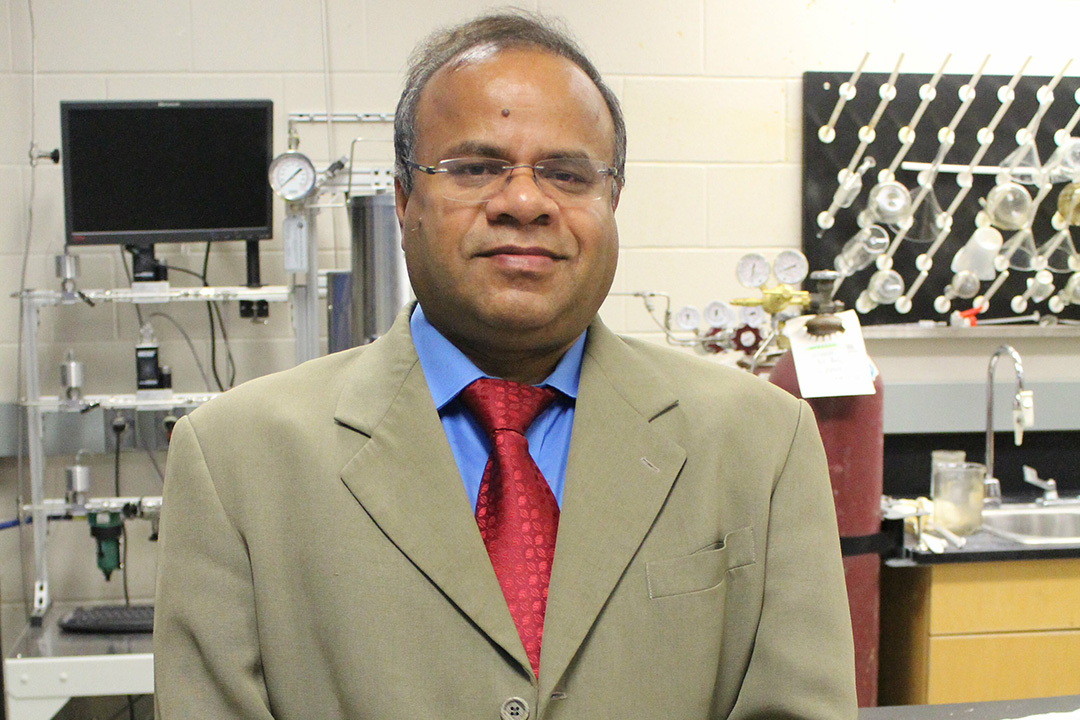
USask's Dalai one of Canada's longest-serving CRCs
Dr. Ajay Dalai (PhD) was a petroleum engineer, early in his career at the University of Saskatchewan (USask) College of Engineering, when he was asked to explore a new research path—bioenergy and its environmental benefits.
By Donella HoffmanIt’s been a very successful 20-year journey.
Today, Dalai is one of the country’s longest-serving Canada Research Chairs, having been the CRC in Bioenergy and Environmentally Friendly Chemical Processing since 2001. His work has made him a world leader in efforts to develop alternative energy sources and he has been awarded more than $36 million in funding from the Natural Sciences and Engineering Research Council of Canada (NSERC) and other competitive sources.
"It has worked out really well, not only for me but for the department, the college, and the university," said Dalai, a distinguished professor in the Department of Chemical and Biological Engineering. "We have brought a lot of new knowledge over the last 20 years to the world."
Dalai began as a Tier 2 chair on July 1, 2001. He and the six other researchers became USask’s first-ever CRCs that year. Of that group only Dalai remains, making him the longest-serving CRC at USask. Though Dalai was trained as a petroleum engineer, he was asked to develop a CRC application focused on bioenergy—renewable energy generated from organic matter. Dalai knew little about it and recalled that it was not on the radar of provincial or federal governments.
“I looked at determining what is the environmental benefit, the financial benefit? What is the benefit to industry? Canada has a lot of natural resources but we didn’t have a lot of technology to transfer these resources into value-added products that can bring in money for farmers,” said Dalai.
In 2009, Dalai became a Tier 1 CRC. His large research group—he supervises more than 30 people every year—now works in three theme areas: bioenergy, heavy oil processing and environmental engineering. Significant achievements include:
- Developing a catalyst, in collaboration with Dr. Hui Wang (PhD) from his department, to transform carbon dioxide and methane—potent greenhouse gases—into synthesis gas, or syngas, a basic feedstock for producing gasoline and other fuels.
- Developing a method to produce biodiesel from low-cost raw materials such as waste cooking oil, soya, green seed canola and mustard, with reduced water usage.
Dalai said it’s rare to find researchers working in both petroleum and bioenergy, and points with satisfaction to a successful 10-year collaboration with SaskPower and the Saskatchewan Research Council to reduce mercury in flue emissions at its Boundary Dam Power Station and a 25-year relationship with Syncrude Canada.
“We’re not only strong in bioenergy, we’re very strong in petroleum research, and in pollution control,” he said.
Dalai’s research program is a great example for other researchers, said Dr. Terry Fonstad (PhD), associate dean research and partnerships at the College of Engineering.
“His work has shaped our research mission,” he said. “He impacts key industries in our province, including agriculture and oil and gas, and shows how expertise from USask Engineering is playing a critical role in for the economies of our province and our country.”
Earlier this year, Dalai was awarded the Royal Society of Canada’s Miroslaw Romanowski Medal for outstanding contributions to environmental science —one of Canada’s highest honours for academics. In October 2020, he was awarded R.S. Jane Memorial Award by the Canadian Society for Chemical Engineering for exceptional achievement to the field of chemical Engineering. He’s published more than 550 research papers, which have been cited more than 28,000 times (his Google Scholar H-index of 78 is considered exceptional), and he has supervised more than 150 graduate students and post-doctoral fellows.
“Ajay Dalai is an inspiring academic,” said Dr. Suzanne Kresta (PhD), dean of USask Engineering. “He exudes enthusiasm and excitement. He’s a world leader in his field due in no small part to the fact he works incredibly hard and holds himself and those around him to a standard of excellence every day.”
Dalai is quick to credit the encouragement of his partner Debasmita over the course of their 30-year marriage, as well as the support of his children, now grown. He said an ability to recruit and mentor high-quality research personnel, prioritize, and provide clear direction to students so that they can meet their goals, have contributed to his success.
“Being passionate is not very difficult when you are surrounded by a lot of talented, world-class students, post-doctoral fellows, mentors and collaborators and have an excellent research climate here at the college and the university,” he said. “How do you stand back and relax when everything is in place to succeed in doing high-quality research?”

